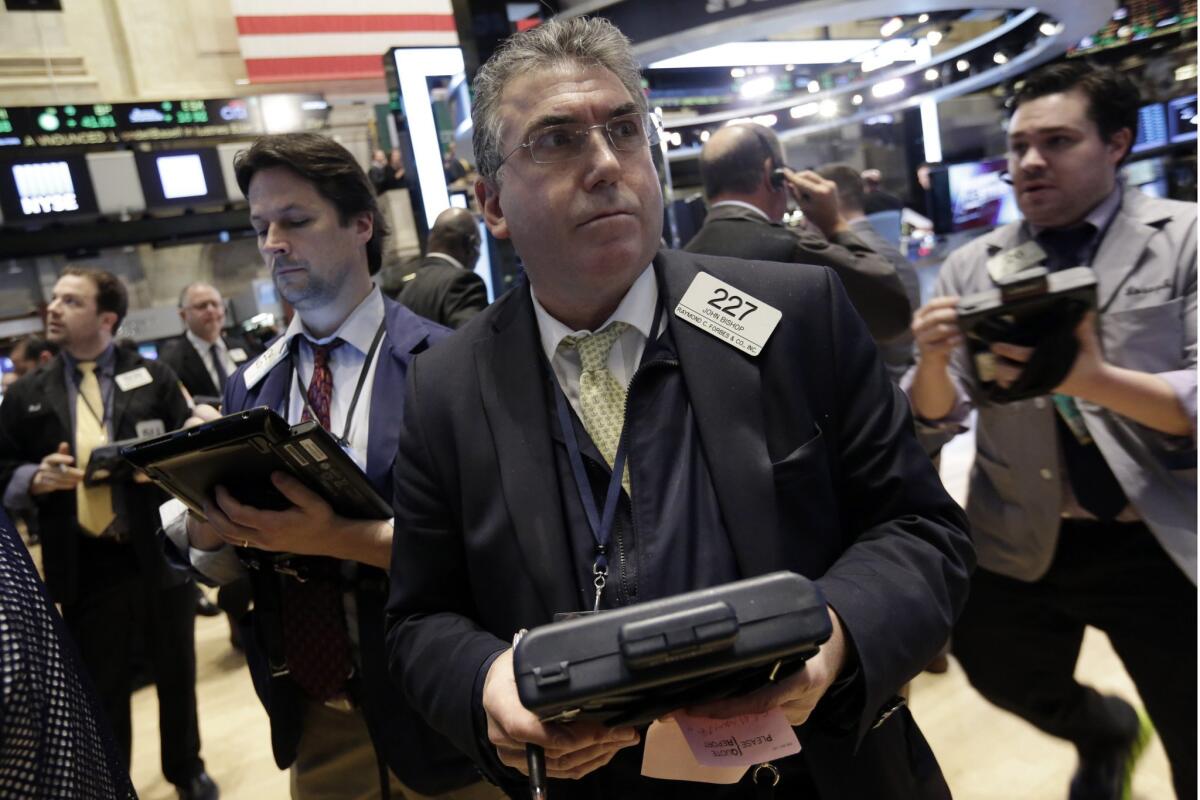Americans see improved job market but a still-vulnerable economy

- Share via
Reporting from Washington — Public sentiment about the economy is finally catching up with the reality of a job market that has been strongly improving, but Americans remain considerably more doubtful about household incomes and the overall security of the economy.
The public’s latest views on the economy came in a report released Thursday by the nonpartisan Pew Research Center.
The improvement in jobs will probably be confirmed Friday when the Labor Department releases its monthly employment figures. They are expected to show another healthy increase in new jobs.
There were mixed signals on the labor market Thursday ahead of the report.
Initial claims for jobless benefits jumped last week to a nine-month high of 320,000, the Labor Department said. The second-straight weekly increase could have been caused by severe winter weather.
At the same time, planned layoffs by U.S. businesses fell 5% in February from the previous month, according to career counseling firm Challenger Gray & Christmas Inc.
Several months of strong job growth have had a notable effect on public views of the economy. Nearly 70% of Americans now say they believe the job situation has at least partially recovered, the Pew report found.
That’s a big change since Pew last asked that question, in September 2013, when fewer than half of Americans thought the job market had begun recovering.
In the current survey, about 7 in 10 Americans said they viewed current economic conditions as “fair” or “good,” and almost 8 in 10 said they believed next year will be the same or better, the poll found. The poll also found majorities holding positive views about improvement in real estate and the stock market, as well as jobs.
Despite those improvements, many Americans still have significant worries about their economic situation and the nation’s.
About 3 in 10 Americans said their personal finances had yet to recover from the recession. Another 3 in 10 said they took a significant hit in the recession and had recovered, while about 4 in 10 said the recession had not had a major effect on them.
The more positive assessments, not surprisingly, came from those higher up the income ladder. Among Americans with household incomes of $100,000 or more, only 14% said they had not yet recovered from the recession, while half said the recession had not significantly affected their personal financial situation.
By about 2 to 1, Americans said the economy remained just as vulnerable to a major crisis as it had been before the financial meltdown in 2008.
Obama administration officials have repeatedly tried to make the case that reforms adopted in 2009 and 2010, including the Dodd-Frank law that expanded oversight of the financial system, have made the economy more stable.
The results of the latest round of so-called stress tests of major banks, released Thursday by the Federal Reserve, backed up those assertions. The nation’s 31 largest banks had enough capital to withstand a severe economic shock similar to the 2008 financial crisis.
It was the first time since the regulators began the tests in 2009 that all major banks would still have capital levels above the Fed’s minimum under such a scenario.
But the Pew survey and others show widespread public skepticism that the economy is better able to withstand a crisis.
By a similar majority of almost 2 to 1, Americans said the economic system “unfairly favors powerful interests.”
Large majorities said government policies since the recession have helped big banks and financial institutions (71%), large corporations (67%) and wealthy people (66%). But many fewer said they see those policies as having helped the poor (32%), small businesses (28%) or the middle class (26%), the latter of which is the group that the vast majority of Americans, nearly 9 in 10, see themselves in.
The belief that the economy tilts toward the powerful is strongest in the center of the American income distribution. Among those with family incomes of $30,000 to $100,000, nearly 70% took that view, the poll found.
Perhaps not surprisingly, those with incomes above $100,000 were somewhat less likely to see the economy as unfair, with 60% saying so.
But that was also true at the bottom of the income ladder, among those with family incomes of $30,000 and below. Among that group, which includes a significant number of young people, minorities and immigrants, 57% said they saw the economy as unfair, while 37% said it was “generally fair to most Americans.”
The Pew poll, conducted by landline and cellphone from Feb. 18 to 22, surveyed 1,504 Americans ages 18 and older. It has a margin of sampling error of +/-2.9 percentage points.
david.lauter@latimes.com
Times staff writer Jim Puzzanghera contributed to this report.
For more on politics and policy, follow @DavidLauter on Twitter.
More to Read
Get the L.A. Times Politics newsletter
Deeply reported insights into legislation, politics and policy from Sacramento, Washington and beyond. In your inbox twice per week.
You may occasionally receive promotional content from the Los Angeles Times.











